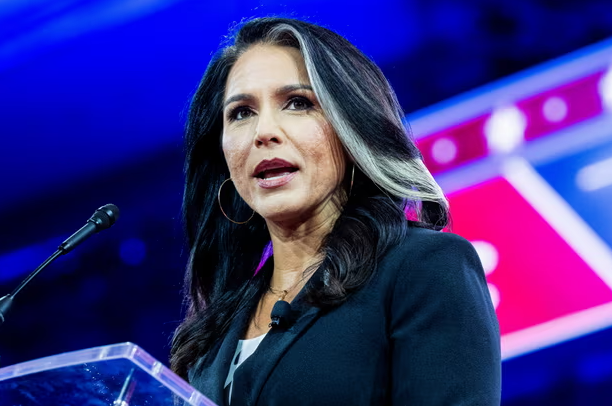Tulsi Gabbard, the erstwhile Congresswoman of Hawaii, didn’t hold back in her critique of VP Kamala Harris’s recent appearance at the southern border. Labeling the affair ‘shameless’, Gabbard portrayed the event more as a carefully orchestrated publicity stunt than a substantial policy discussion. The former Congresswoman has been known to voice strong opinions, including her notable endorsement of ex-President Trump over Harris in the previous electoral race.
Gabbard minced no words in communicating her frustration, stating, ‘It is nothing but shameless. Kamala Harris’s photo op at the southern border, coupled with security promises, seems disturbingly empty considering the over ten million undocumented immigrants that have reportedly surged into the country during her tenure as border chief.’ Gabbard’s assertion alluded to Harris’s seeming lack of remorse or accountability for the situation at the border, leading her to question the Vice President’s sense of duty and principles.
According to Gabbard, ‘A person who is devoid of shame does not carry a conscience, and that, unfortunately, epitomizes Kamala Harris.’ The former Congresswoman’s choice of words may be considered abrasive; however, her sentiment is representative of a sizeable portion of the American public who are yearning for concrete action and solutions in lieu of political theatre.
Harris’s journey led her to break her long-hiatus from the U.S-Mexico border with a visit to Douglas, Arizona. Once there, she utilized the platform to indict former President Donald Trump’s opposition to the bipartisan border bill. An act she claimed had undermined endeavors geared toward strengthening border security.
Addressing her audience, she remarked, ‘The border security bill was the most potent we’ve witnessed in many years. With backing from the Border Patrol union, the bill should be currently active, enforcing real-time consequences for the safety and protection of our nation.’ Yet, taking a closer examination of the provisions detailed in the border bill, the image painted may not be as reinforcing as initially thought.
The bill contained various propositions. For one, it planned to propel the rate of lawful immigration into the United States. Furthermore, the legislation aimed to expedite the issuance of work permits to immigrants who reach the southern border. Moreover, it intended to allow a substantial number of crossings at the border weekly before the Department of Homeland Security could initiate clampdown measures in regions found between Ports of Entry.
The border bill also sought to embed the Biden-Harris administration’s parole policies within the confines of federal law. Apart from that, the bill promised to allocate taxpayers’ money for lawyers assigned to specific categories of Unaccompanied Alien Children (UACs) and psychologically challenged immigrants. These components seem to shift the central focus away from enhancing border security.
Flatly rejecting ex-President Trump, Harris added, ‘Trump annulled it. He made some calls to his alliances in Congress with a firm instruction: Halt the bill.’ She argued that Trump preferred to use border insecurity as a fiery campaign issue instead of actively striving to resolve it.
Harris didn’t stop at just critiquing Trump, she extended her criticism to his approach towards leadership in general, believing he prioritized personal politics over the country’s needs. As she put it, ‘The American people are deserving of a leader whose focus elevates border security over petty political maneuvers and individual political aspirations.’
Recently, Gabbard voiced her concerns over the magnitude of individuals who ‘have illegally trespassed our borders.’ This influx of undocumented immigrants is seen by her as a ‘direct threat to the security and welfare of our homeland,’ underscoring the severity and urgency of the situation.
Gabbard drew from her own experiences when she visited the southern border, discerning first-hand the challenges posed by the rapid influx of undocumented immigrants. She also echoed the sentiments of those who believe that this predicament affects not only border communities but also the broader public and national security.
In her critique, it’s apparent that Gabbard seeks not just strong border control but also responsible and respectful immigration policy. She seems to believe immigration policies should honor the rule of law and prioritize the well-being of the U.S. citizens, also recognizing that those attempting to cross the border are, in most instances, desperate individuals seeking a better life.
It’s evident that both Gabbard and Harris share deep concern for the state of the border, though their conceptualizations of the issue and proposed solutions diverge greatly. At the end of the day, the fate of U.S. immigration policy and border security will largely hinge on the will and ability to engage in meaningful, constructive dialogue and negotiation.
The southern U.S. border presents an ongoing challenge for the nation. This issue requires deeply thoughtful consideration and must not be reduced to political point-scoring or photo ops. It is a significant and complex problem, demanding the coherent and concerted effort of leaders across the political spectrum to reach sustainable, broadly agreeable solutions.
Shameless. No other way to describe Kamala Harris’ photo op at Southern border, promising to secure it after allowing 10+ million illegal aliens in the past 3.5 years as border czar. A shameless person feels no shame because they have no conscience. That’s Kamala Harris.
— Tulsi Gabbard ? (@TulsiGabbard) September 28, 2024


